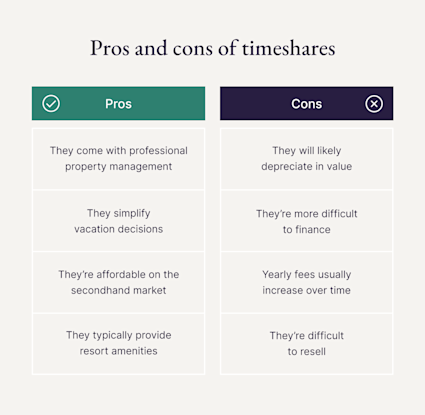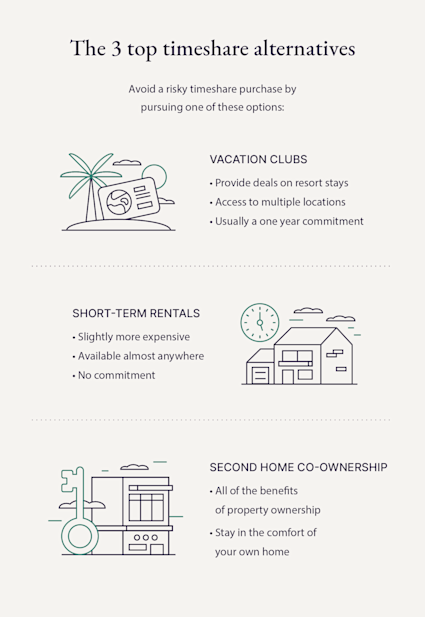What are timeshares anyway?

- Deeded: The owner can use, rent or sell the share of time they own in a single property.
- Non-deeded: The owner leases their time in a property, sometimes having the option to use multiple locations.
Timeshare benefits
While timeshares face a lot of criticism, they wouldn’t still be around if they didn’t offer some benefits to their users. Take a look at some reasons why people are still buying timeshares.The property is professionally managed
Timeshares operate similarly to a condominium, with owners paying annual fees for the maintenance of the property. These are put toward keeping the property in good shape and updating amenities to retain appeal.Since fees are shared between all owners, it can be a smaller financial burden than being the sole owner of a house.It simplifies vacation decisions
If you are prone to indecisiveness when looking at the long list of desirable vacation destinations, having a designated location to return to every year can make the process easier. Joining a timeshare that provides a network of locations to choose from reduces the risk of growing tired of a single spot, while still narrowing down possible options.Secondhand timeshares are affordable
Since an owner’s stake in a timeshare isn’t tied to the value of the property, prices of timeshares often go down when resold. This is partly due to the recurring yearly fees. Owners who have grown tired of the timeshare or can no longer afford it often sell the property for pennies on the dollar. If the yearly fees are worth the vacation experience to you, buying used is a viable option. You will want to make sure there aren’t any hidden costs with the purchase, so make sure the current owner is up to date on their dues and doesn’t owe a special assessment.Access to resort amenities
Timeshare buildings often provide access to a swimming pool, gym, beach, ski mountain and more. The property manager handles all maintenance, so you’re free to enjoy them without stress.Timeshare risks
Despite the benefits timeshare programs offer, there are some glaring drawbacks.The value rarely appreciates
It’s important to remember that purchasing a timeshare is not the same as investing in real estate. Don’t expect to sell your share for more money in the future, or even for the same price you paid for it. This is one of the greatest problems with timeshares and is usually the main reason they’re avoided. All the money you spend on the timeshare should be seen as irretrievable.Financing is expensive
A timeshare purchase can’t be financed through a traditional mortgage since the lender can’t foreclose on the property if the buyer stops making payments. Instead, a buyer needs to get a personal loan, pay in cash, use a credit card or get a home equity loan. Tax breaks also don’t apply to timeshares like they do for other real estate investments.Timeshare costs usually increase over time
Timeshare fees aren’t fixed at a specific dollar amount. As inflation rises, it’s likely your annual payments will as well. On top of that, owners are required to pay for major repairs or upgrades if their annual fees aren’t enough. A big problem with timeshares that use points-based programs is that the point value may decrease over time. Locations that cost 75 points to visit this year, for example, may cost 100 points next year, greatly reducing the affordability after you’ve already made a purchase.The timeshare manager may also increase points at desirable locations or during peak travel dates to offset owner demands, so you may not be able to use it when or as often as you want.Timeshares are hard to resell
Due to the previously mentioned downsides of buying a timeshare, the potential buyers market is small. To make matters worse, some timeshare programs don’t transfer all of the same privileges to a second buyer, making it even more difficult to sell in the future. While you’re in limbo trying to find a buyer, you’ll still be responsible for paying all timeshare costs for an indefinite period.So are timeshares worth it? 5 factors to consider

Accommodations
Compare the cost of a timeshare and its annual fees to the cost of a weeklong stay in a short-term rental in the same location. Which gives you more bang for your buck?Remember to account for amenities and square footage in your comparisons. Since timeshares are similar to condos, they’ll often have kitchens, pools, spas and more at your disposal.Booking
Think about how you plan your vacations. Are you comfortable with making plans six months or more in advance, or does that make it feel less like an adventure and more like an assignment?Highly sought-after travel dates are competitive, so you may not be able to take advantage of those long holiday weekends.Destinations
Do you have locations that you enjoy returning to again and again, or do you like to mix it up? Consider how owning a timeshare might affect your future travel plans.For example, your kids might love traveling to Orlando, Florida, when they’re young, but grow tired of it as they get older. You’ll still be paying timeshare dues until you can sell it.Deeded ownership
Since there’s no guarantee a timeshare will appreciate in value, they usually aren’t seen as valuable assets. Leaving a timeshare to an heir is closer to leaving them with a hefty yearly maintenance bill. Unless you have an adult child who has expressed interest in inheriting the timeshare, it’s not a great legacy.Flexibility
Many timeshare corporations allow you to trade your week(s) at your home resort for time at a different resort, as long as it’s part of their parent company. Despite the hype this perk gets from salespeople, most resorts in popular destinations fill up quickly and are more expensive to book, even if you’re a timeshare owner. If your timeshare is in a less popular locale, its trading power is probably less than you think, and it might be difficult to trade up. If you do decide to buy a timeshare, make sure you really like the resort that will be your home base, because you may not be able to trade.But what are some timeshare alternatives?

Vacation clubs
Vacation clubs give members the benefits of resort-like amenities without the financial commitment or travel constraints. Members pay a yearly fee and receive discounts on stays at different locations in the club’s network. As with everything, the quality of vacation clubs does vary, so you’ll want to thoroughly research a club to make sure it delivers on its promises.Short-term rentals
The freedom offered by short-term vacation rental sites like Airbnb may be worth the added expense. You won’t be tied to any contracts, and you can make travel plans that are less than a week away and visit just about any place in the world. The costs may be greater in the long run, but the risks are much smaller. If you have an issue with one service or host, you can choose to never work with them again.Second home co-ownership
If you’re in love with a specific destination but find that the risks of a timeshare aren’t worth the rewards, co-owning a second home may be the solution. Having multiple buyers makes the purchase price significantly smaller per person, and you share the costs of maintaining the property. And unlike a timeshare, you’ll have equity in the property. If you purchase a second home through Pacaso, you’ll get the added benefits of luxury amenities with turnkey property management. You won’t need to worry about furnishing the space or maintaining the premises. We’ve got it covered. So are timeshares worth it? The answer is rarely, given other alternatives that provide greater flexibility and potential return on investment. Before committing to a timeshare, take the time to research available options that might better suit your needs.Pros and cons of timeshares FAQ
01: What is the downside of owning a timeshare?
Timeshares often depreciate in value, have more expensive financing and increasing costs over time. Additionally, they can be hard to resell as some timeshare programs don't transfer to a second buyer.
02: Are timeshares actually worth it?
A timeshare can be a good investment, but there are things to consider like advanced booking, flexibility, depreciation and transferring the timeshare to heirs.
03: Do you ever pay off a timeshare?
No, since a timeshare is not owned, you never pay it off.
04: Will you regret buying a timeshare?
Some may regret buying a timeshare due to the increasing expenses and decreasing value. Timeshares may also be difficult to resell.









